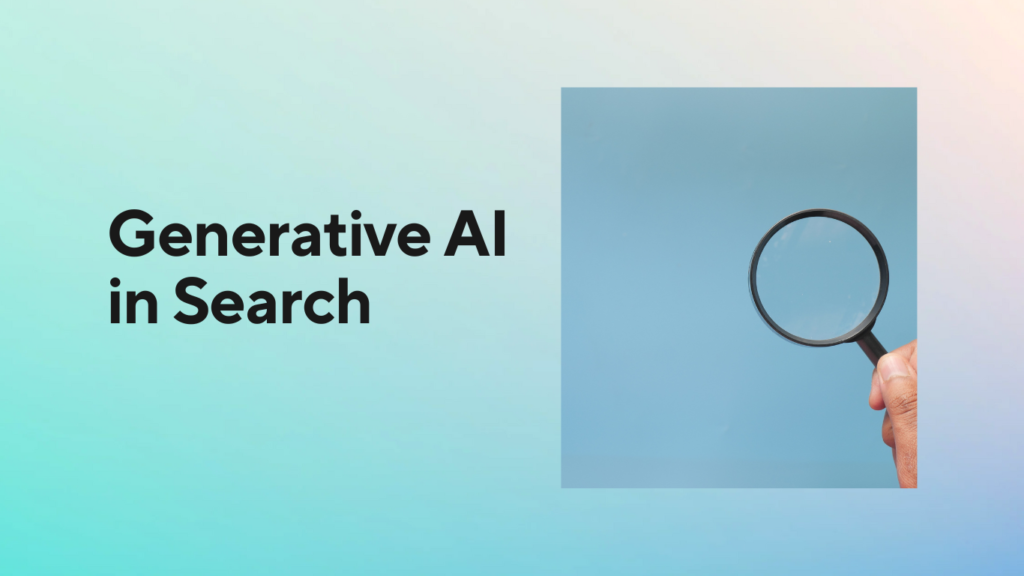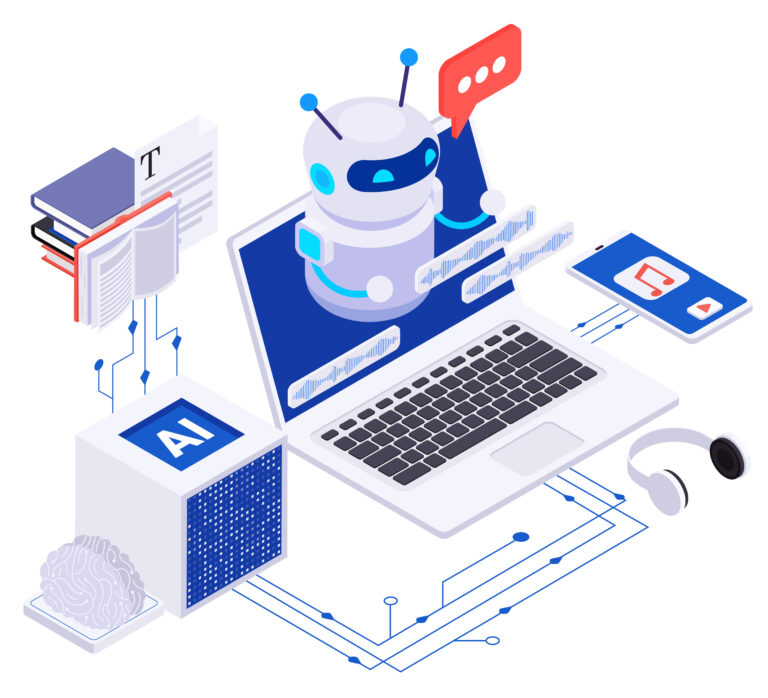
Search is no longer just about finding links—it’s about finding answers. Traditional search engines match keywords, but Generative AI goes beyond that by interpreting intent, context, and personalization to deliver real-time insights.
Like, you put this search query, “What’s the best marketing strategy for your business?” Instead of browsing multiple websites, AI-powered search engines such as Google’s SGEanalyze trends, extract insights, and generate a tailored strategy.
Believe me! This shift isn’t just about faster results—it’s about intelligent decision-making.
What Is Generative AI In search?
Generative AI is changing how people search, making results more direct, personalized and interactive.
According to the latest survey, “45% Of the US population already uses generative AI for searching purposes”
This trend shows a shift away from keyword-based searches toward AI-generated responses.
Unlike traditional search engines that rely on indexed web pages and ranking algorithms, generative AI understands user intent and creates humanized responses. Google’s Search Generative Experience (SGE) and Microsoft’s Bing AI chat are prime examples.
Let’s look at how the process works with Google’s Search Generative Experience:
If you search for “best smartphones under $500”, traditional Google Search will return a list of websites, including product reviews, comparison blogs, and e-commerce listings.
Here’s how generative AI processes the search:
- Query Understanding
SGE recognizes that you’re looking for a list of smartphones within a specific budget and prioritizes key factors like performance, battery life, and camera quality.
- Data Processing
To gather up-to-date information, AI scans multiple sources—tech review websites, e-commerce platforms (Amazon, Best Buy), and user forums (Reddit, Quora).
- Response Generation
Instead of listing links, AI generates a detailed summary:
- Top 3 smartphones under $500 with their pros and cons.
- Real-time price comparisons from multiple retailers.
- Key features breakdown (battery life, display quality, performance).
- Personalization
- If you’ve previously searched for “best camera phones”, SGE prioritizes camera specs in the recommendation.
- If you’ve looked at gaming phones, it highlights processor and refresh rate details.
The Shift From Traditional To Generative AI Search
Traditional search engines function as digital directories. It just matches keywords to web pages. You need to sift through links, compare information, and refine queries manually.
This lacks nuance and treats all searches equally without recognizing intent.
A recent study by Semrush revealed that “ One in ten U.S internet users now rely on generative AI as their primary searching tool.”
This is because generative AI enhances search by delivering precise, structured answers instead of static links.
Explore how it works:
Note: When I search the query “ The Shift from Traditional to Generative AI Search”, the AI overview automatically comes up. You can see that it is also connected with links so you can authenticate the information.
The Shift: Traditional vs. Generative AI Search
Traditional Search
- Lists static web pages requiring manual filtering.
- Relies on exact keywords rather than intent.
- Lacks personalization and contextual responses.
Generative AI Search (e.g., Google’s SGE, ChatGPT, Gemini)
- Provides real-time, structured insights.
- Aggregates multiple sources for a single response.
- Adapts to user behavior, offering personalized recommendations.
Luke Hobson from MIT xPRO notes, “Generative AI has finally been the gateway for many people to engage with AI.”
No doubt, this shift is redefining information access—moving users from searching to discovering, from browsing to instant understanding with:
- Fast and Actionable Insights
- Better understanding
- Personalized experience.
Key Benefits Of Generative AI In Search
- Enhanced Contextual Understanding
Traditional search engines rely on keyword matching. It misses the intent of your search query. Conversely, Generative AI interprets entire queries contextually, considering its tone, syntax and semantics.
For example, when you search “How to do marathon training” on Microsoft Bing, it analyzes vast product data, customer reviews and expert insights to provide a summarized recommendation, comparing durability, support and brand reputation.
- Personalized User Experiences
Traditional search engines deliver results based on static algorithms. You can receive the same results regardless of individual preferences. On the other hand, Generative AI evolves with user behaviour.
- How It Works: AI tracks search history, preferences and past interactions to refine future queries.
Searching for “best smartphones under $500” may initially show general results. Still, if a user repeatedly clicks on camera-focused reviews, AI will prioritize content related to photography-centric devices in future searches.
Analytical Takeaway: Personalized AI search mimics a human assistant, offering tailored responses instead of a generic list of links.
- Conversational And Natural Language Queries
Old search models need keyword-based precision. It makes searches slightly mechanical-like (“best budget laptop 2024”). Generative AI understands context, intent and conversational flow (“What’s the best laptop under $700 with a long battery life?”).
AI models like GPT-4 and Gemini break down sentences to interpret meaning rather than just matching keywords.
A search for “How do I improve my home’s WiFi speed?” provides you a direct and structured guide like this:
- Faster Data Retrieval and Analysis: AI as an Information Aggregator
Traditional search engines generate multiple links, requiring users to visit and compare sources manually. Generative AI eliminates this by synthesizing information from various sources into a single, structured response, reducing the time spent on research.
- Data-Centric Example:
Scenario: A user searches for “Tesla Model 3 vs. BMW i4: which is better?”
Traditional Search Approach:
- Google returns 10+ website links (reviews, forum discussions, manufacturer pages).
- The user spends 15-20 minutes clicking different sources, reading opinions, and manually comparing specifications.
Generative AI Search Approach (Google SGE, ChatGPT, Gemini):
- AI aggregates data from multiple sources (manufacturer specs, expert reviews, customer feedback).
- AI generates a structured table summarizing key differences:
What Are The Challenges & Risks In Generative AI Search?
- Misinformation & Bias
No doubt, AI-generated content is flooded on the internet. Everyone is using AI either for writing articles or organizing and summarizing it. But you should understand that AI-driven content is only as reliable as the given input or trained data.
The solution is simple: search engines need to continuously audit AI models and integrate fact-checking processes. Plus, organizations can also hire independent fact checkers to verify the AI-generated information.
2. Security & Privacy Concerns
Generative AI searches process vast amounts of personal data to provide customized responses. It raises concerns about how user information is stored and used.
Example: OpenAI and Google’s AI models collect user queries. It stores sensitive information that could be accessed through breaches.
Risk: If AI search tools retain personal search history, they could become targets for cyberattacks or be used for intrusive tracking.
Solution: Companies must enforce strict data anonymization, encryption and transparency in AI search models.
3. Compliance & Ethical Issues
Frankly, AI-generated search results can sometimes cross the jurisdiction of copyright laws or ethical guidelines. It occurs as you pull content from various sources without giving proper attention.
Example: The New York Times vs OpenAI & Microsoft
Source: NYT
In December 2023, The New York Times filed a landmark lawsuit against OpenAI and Microsoft.
The management of this international newspaper filed a suit in the Federal District Court in Manhattan. According to the official information, “This suit aims to destroy any chatbot models and training data that use copyrighted material.
If you continuously use AI-generated content, it can create a “black box” effect. This reduces the transparency of information, as the user doesn’t know its real origin.
Solution?
To deal with this issue, AI search engines need to implement:
- Clear citations
- Credit sources
- Comply with the copyright policies
4. Over-Reliance On AI Responses
Example: According to an independent study, “Users rely solely on AI-generated answers and are 30% less likely to fact-check or verify sources than traditional search users.”
You may be surprised to know that AI can sometimes produce hallucinations. It’s basically incorrect yet plausible-sounding information.
Solution: AI search models should encourage source verification, display multiple perspectives, and provide access to original documents to maintain balanced and accurate information retrieval.
How You Can Use Generate AI search
In contrast with traditional search engines like Yahoo, Bing, DuckDuckGo, Baidu, Yandex, Ask.com and others which retrieve a list of links, Gen AI changes how you access, interpret, and apply information.
If you haven’t yet believed then you can look at AI-driven search engines like Google’s SGE, ChatGPT , Perplexity AI and others with their contextualized responses.
- Use Conversational Queries for Precision
Traditional search relies on exact-match keywords, whereas AI-powered search understands natural language and intent, making queries more fluid and accurate.
Example: Instead of searching “best budget laptops 2024”, refine it to:
“Which laptops under $700 offer the best battery life and performance for video editing in 2024, based on expert reviews?”
AI will generate a curated response, summarizing product specifications, user reviews, and industry ratings without requiring you to sift through multiple websites.
- Conduct Real-Time Market & Competitor Research
AI search engines can process millions of data points across industries, aggregating information from news reports, market trends, and competitor strategies into digestible insights.
Example: A marketing executive can ask:
“What are the most effective social media ad strategies 2024 for fashion brands?”
Instead of displaying multiple links, AI search summarizes industry trends, case studies, and real-time performance metrics from various sources.
Case Study: SEMrush & SimilarWeb integrate AI-driven insights to provide businesses with real-time SEO and market intelligence, demonstrating how AI search enhances competitive strategy.
- Leverage AI For Instant Content Summarization
AI search tools can summarize lengthy reports, research papers, or earnings calls into concise, actionable takeaways.
Example: Instead of reading a 100-page financial report, ask:
“Summarize Tesla’s latest earnings call, highlighting revenue growth, market forecasts, and key executive statements.”
AI will condense key points into a structured summary, saving time while ensuring comprehension.
Industry Impact: BloombergGPT, a specialized AI model, has been trained on millions of financial documents to generate precise investment insights—showcasing AI’s capability to streamline research in professional sectors.
- Get Hyper-Personalized Search Recommendations
AI search learns from your past behaviour, preferences, and browsing history to provide tailored results, making searches more relevant over time.
Example: A runner searching for “best running shoes for marathon training” might get:
- Personalized suggestions based on foot arch type, running surface, and training intensity.
- A curated comparison of shoes ranked by durability, comfort, and expert reviews.
- Real-time pricing and availability from top retailers.
Google’s AI-powered Shopping Graph processes over 35 billion product listings daily to personalize shopping results, ensuring users receive the most relevant recommendations.
Bottom Line
AI-powered search isn’t the future–it’s already here. Faster insights, smarter recommendations and real-time adaptability make it a game-changer for businesses and individuals.
But with power comes responsibility. Bias, misinformation, and content ownership issues demand critical thinking. The smartest approach?
Stay ahead with Generative AI in search! Discover how AI is changing search engines for smart rankings and better user experiences. Explore more with Exposure Post!
Also Read: DeepSeek Prompts for SEO Content You Can Use in 2025


